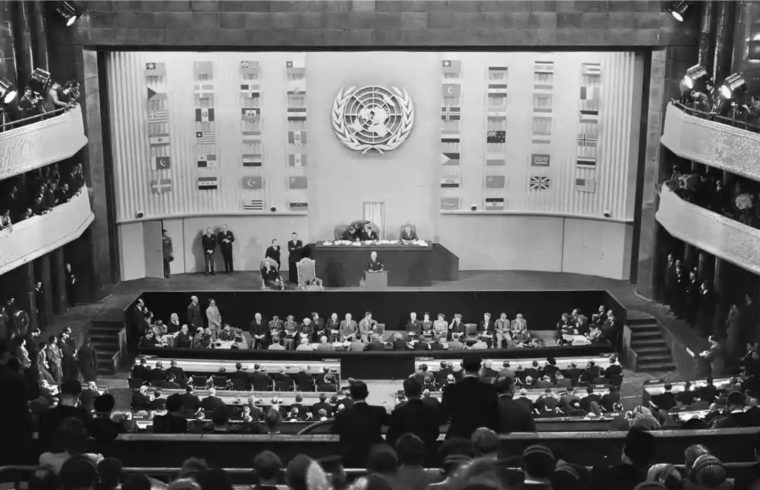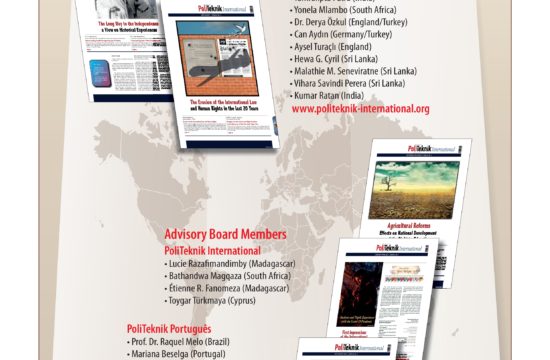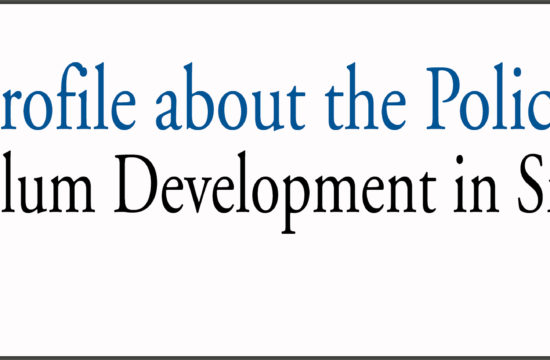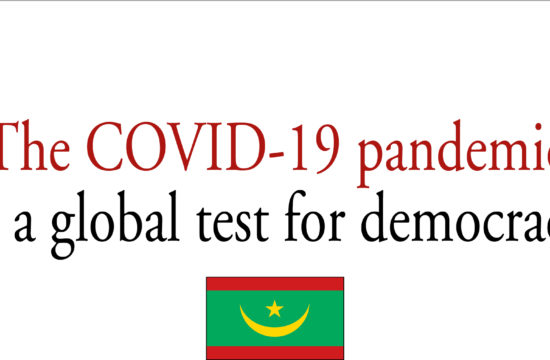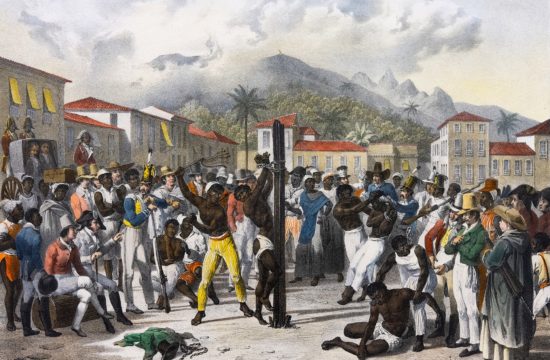Raquel Melo1 State University of Paraíba – BRASIL
The Project “Extension of the Human Right to Education” arises from the articulation of multiple social actors linked to the fi eld of education – universities, unions, national and regional non-governmental organizations, social movements, teachers and students, in 36 countries (up to the time). The objective is to “mobilize the world community and the United Nations”2 and, more specifi cally, submit to the General Assembly of the United Nations a document containing suggestions and alternatives for the progressive extension of article 26 of the Universal Declaration of Human Rights (UDHR from now onwards), so that education is capable of strengthening peace and social justice.
In this essay, I intend to raise some questions that allow us to reflect on the limits of the UN in actually absorbing these recommendations, which involves not only possible conflicts of interest on the part of its member states, but also the very worldview of the UN, as an international bureaucracy emerged from a western hegemonial context.
Adopted by the UN General Assembly in 1948, the UDHR enumerated the human rights already mentioned generically in the organization’s founding Charter. Among them is the right of every person to education. In order to guarantee this right, article 26 states that education must be free, at least at elementary and fundamental levels, and that “higher education shall be equally accessible to all on the basis of merit”.
Lindgren Alves (2013, p. 24) draws attention to the Western character of the UDHR, highlighting its Enlightenment heritage, like that of the UN itself. The author states the following:
Adopted in this way, without consensus, in a forum then composed of only 56 States, Western or “Westernized”, the Universal Declaration of Human Rights was not, therefore, “universal” even for those who participated in its creation. Under these conditions, those who did not participate – the vast majority of today’s independent States – had more reason to label the document as a “product of the West”. (Alves, 2013, p. 24, free translation).
The mention of merit as a form of access to higher education in article 26 is an example of the liberal and western character of the UDHR. Meritocracy, as an expression of the universalist ideology, which supports the modern world-system (Wallesrtein, 2007, p. 38), makes invisible the discrimination and exclusion of groups based on color, origin, gender, social class, disabilities and other markers, hindering their access to human rights, such as education, while legitimizing the privileges granted to those who ascend to certain positions supposedly by “merit” (Wallerstein, 2007, p. 40).
Universalism, operationalized, among other ways, by meritocracy, is important for the formation of a qualified technical staff capable of ensuring the efficiency of the capitalist economy and, therefore, the accumulation of capital – which is the ultimate purpose of the system (Wallerstein, 2007, p.40). However, this meritocratic universalism is preceded by an anti-universalism (Wallerstein, 2007, p. 40), which ensures that universalism only applies to a specific privileged group of people while other groups are subject to subordination and exploitation inherent in a system based on capital accumulation and inequality.
In Brazil, a newspaper with large national circulation recently published an article with the following headline: “Blacks face extra barriers to enter a course of international relations”3. In this specific case, knowledge of several languages and geographic distance – most courses are concentrated in the richest regions of the country – are pointed out as the main obstacles to the black population. In the same article, attention is drawn to the fact that, despite the quota policy adopted in public universities in Brazil between 2004 and 2012 – when it became mandatory – the representation of blacks in universities is still low in relation to whites.
Obstacles in access to higher education for certain groups are structural and of an economic and social nature, intrinsically associated with the past and present colonialism and with the international capitalism system. As such they are made invisible by the liberal western order what is consistent with the text of the article 26 of the UDHR when it legitimizes meritocracy as an expression of universalism. The CoVID-19 pandemic made clear the precariousness of the right to education, especially among excluded groups and individuals, in the context of a system in which inequality is a pre-condition for its existence. More than an economic system, the world system (Wallerstein, 2007) needs to be understood in the Gramscian sense, which implies a symbiotic relation between an economic mode and a certain structure of hegemonic ideas (culture). Modern Western liberalism provides the ideological apparatus for capitalism, by naturalizing individualism, competition, meritocracy and the superiority of white western men. It is within this ideological framework that the United Nations operates.
From this perspective, it is important to question the notion of humanity underlying the Western liberal paradigm and what are the limits of universalism in the Universal Declaration of Human Rights.
In 1976, the Covenant on Civil and Political Rights and the Covenant on Economic, Social and Cultural Rights came into force, aimed at regulating the application of the rights recognized by the Universal Declaration (Alves, 2003, p. 48). It is important to note that, according to Lindgren Alves (2003), the creation of two separate pacts to deal with human rights was a requirement of Western countries, as they understood that they were dealing with two distinct categories of rights, the first one (civil and political rights) which were subject to jurisdictional collection and the second one (social, economic and cultural rights) which was not.
As a result, basic rights, such as the right to adequate food, to adequate housing, to education and to health, continues to be denied to subaltern and exploited groups in a very unequal system. That impedes them to exercise their individual rights and guarantees as well. This cycle reveals the continuous reproduction by liberalism of the separation between two classes of human beings (Grovogui, 2006). On the one hand, the white western man, who has always been given the titulary of human rights; on the other hand all the others who have their humanity more or less denied on the basis of the intersection among their color, gender, sexual orientation, origin, economic status and so on.
Those “subhuman” people are also represented by Paulo Freire (2019) in the figure of the oppressed, those subjects dehumanized and made to be less, a “distortion of being more, which is the “vocation” of all people, but denied to the oppressed “by the injustice, the exploitation, the oppression, and the violence of the oppressors” (Freire, 2019, p. 40).
Given this, the questions that arise are: How to defi ne education? How to extend the human right to education in the context of a capitalist western neoliberal order? If education is to be defined in terms of emancipatory education that enhances the capacity of oppressed individuals and groups to claim the humanity that is systematically denied to them, as well as their economic and social rights beyond a legal abstraction, then the human right to education requires the disruption of the world-system in which the relations of inequality and subordination are structured. Considering the cultural and epistemological hegemony of the Western liberal paradigm reproduced by modern institutions – school, church, family and international institutions such as the UN – it remains to be seen to what extent the voices of peripheral groups and individuals on the matter will be taken into account by the Organization and by its member states.
It is important to point out that even though the UN General Assembly is made up of a majority of states from the Global South – using the term as the UN applies it to identify developing countries – the interests of those states and national elites do not necessarily reflect the interests of groups and individuals from the Global South. The concept of the Global South that I’m referring to here is not necessarily defined by state borders or by geographic criteria but by an identity built from the awareness of a common past (and present) of colonial exploitation and subordination as well as of resistance. However, this does not mean that the Global South is a homogenous or fi xed identity. On the contrary, it is made of diversity and even contradictions, which makes the concept much more complex. That is why we have many “souths” within the South (Alden, Morphet e Vieira, 2010) and many “souths” within the North too.
That being said, I stress the importance of this broad articulation of social actors in more than 36 countries, many of them in Africa, Asia and Latin America, to discuss education as a human right in a critical perspective. The above limitations do not mean that they should not present a document to the United Nations, especially if we recognize not only the power of states in a territorialized world largely defined in terms of national frontiers, but also the important role of the UN in promoting and disseminating norms (in a broad sense) in such a world. Therefore, my argument is that this should be one of several goals of this big initiative. I believe that the greatest achievements of the project “Extension of the Human Right to Education” are to amplify the voices and perspectives from the Global South on the right to education, to promote the exchange of experiences and partnerships among social actors, for the creation and implementation, at the local level, of strategies for the promotion of critical education that reaches the most excluded and enhances their capacity to organize themselves politically to claim their humanity and their vocation to be more.
REFERENCIAS
Alves, J.A. Lindgren (2013). Os direitos humanos na pósmodernidade. São Paulo: Perspectiva.
Alden, C.; Morpehet, S.; Vieira, M. (2010). The South in World Politics. UK: Pallgrave MacMillan Press.
Freire, Paulo (2019). Pedagogia do Oprimido. Paz e Terra. 71a Ed.
Grovogui, Siba N (2006). Elements of a Postcolonial Human Rights Discourse. In: JONES, Jones,
Branwyn Gruff ynd. Decolonizing International Relations. USA: Rowman and Littlefi eld Publisher, Inc..
- Professor of International Relations at the State University of Paraíba, researcher at the Center for Advanced Studies in Public Policy and Governance, coordinator of Resista – Human Rights Education in the Global South.
- The Human Right to Education Extension Project, p. 03. Available in http://politeknik-international.org/wp-content/uploads/2021/06/PROJECT_DOSSIER_POR.pdf
- Folha de São Paulo, 26th of November, 2021.

